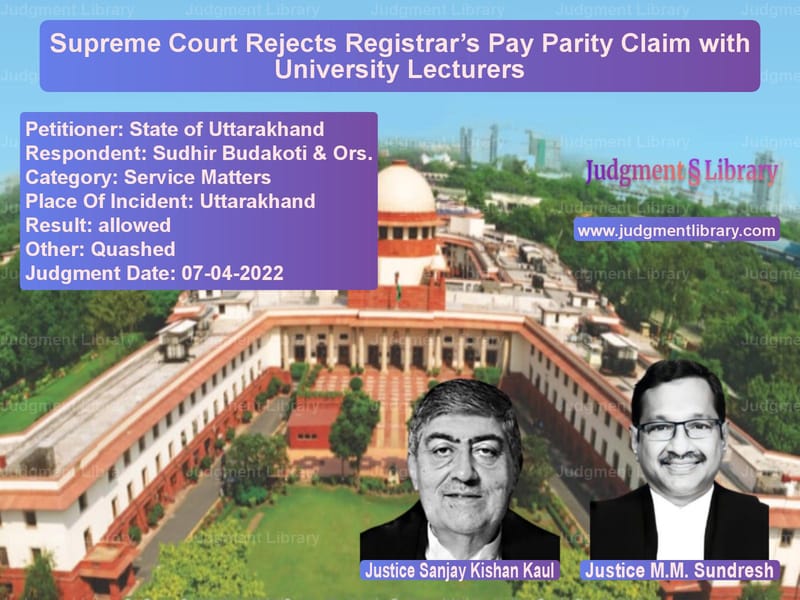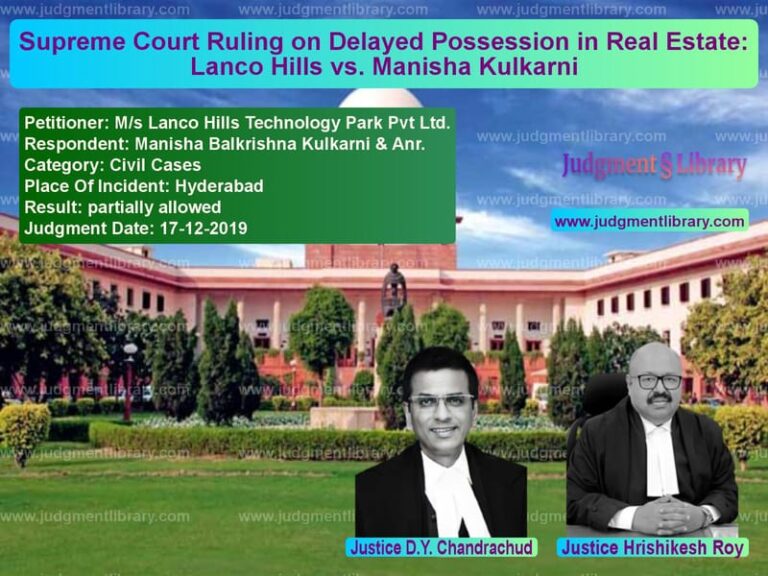Supreme Court Rejects Registrar’s Pay Parity Claim with University Lecturers
The case of State of Uttarakhand vs. Sudhir Budakoti & Ors. revolves around the demand for pay parity between Registrars and Lecturers in state universities. The Supreme Court set aside the Uttarakhand High Court’s ruling, affirming that administrative officers and teaching faculty belong to separate classifications, and their pay scales need not be identical.
Background of the Case
The case originated when Sudhir Budakoti, appointed as a Registrar in Kumaon University, filed a writ petition in the Uttarakhand High Court, seeking the same revised pay scale as Lecturers, citing recommendations from the University Grants Commission (UGC). The High Court ruled in favor of Budakoti, prompting the State of Uttarakhand to appeal to the Supreme Court.
Key facts in the case:
- The Uttar Pradesh State Universities Act, 1973, which governed university appointments, was adopted by Uttarakhand in 2001.
- The Uttarakhand State University (Centralized Services) Rules, 2006, laid out qualifications, recruitment process, and pay scales for Registrars.
- The Government of India revised pay scales in 2008 for Central Universities, granting higher salaries to teaching staff.
- The Uttarakhand government implemented these revisions only for Lecturers but not for Registrars.
- Budakoti was appointed as Registrar on November 23, 2009, under the existing pay scale.
- In 2011, he filed a writ petition seeking parity with Lecturers, claiming that Registrars performed similar or additional duties.
Arguments of the Petitioner (State of Uttarakhand)
- The government argued that the UGC’s revised pay scale was only binding on Central Universities, not state universities.
- Lecturers and Registrars belong to distinct classifications—one is for academic teaching, while the other is for administration.
- Budakoti was fully aware of his pay scale at the time of appointment and had no accrued right to demand parity.
- Financial implications of granting such pay parity would affect the entire administrative staff of the university.
Arguments of the Respondents (Sudhir Budakoti & Ors.)
- Budakoti argued that he performed additional duties, sometimes taking up teaching assignments.
- The state government had already implemented the UGC pay scale for Lecturers but arbitrarily excluded Registrars.
- The classification was unfair since both roles contributed equally to university operations.
Supreme Court’s Ruling
The Supreme Court, comprising Justices Sanjay Kishan Kaul and M.M. Sundresh, overturned the Uttarakhand High Court’s decision.
1. Pay Parity Is Not an Absolute Right
The Court reiterated that pay parity cannot be claimed solely based on perceived similarity in responsibilities.
“When two identified groups are not equal, certainly they cannot be treated as a homogeneous group.”
2. Lecturers and Registrars Form Separate Classifications
The Court emphasized that Lecturers are primarily responsible for academic duties, while Registrars handle administration. It ruled:
“One is meant for administration and the other for teaching. They cannot be compared for the purpose of pay parity.”
3. UGC Pay Scale for Central Universities Is Not Binding on States
The Court ruled that state governments are not obligated to adopt UGC recommendations unless expressly mandated:
“The pay scale prescribed by the UGC for Central Universities does not automatically extend to state universities.”
4. Temporary Work Assignments Do Not Alter Classification
The Court rejected Budakoti’s argument that he had taken up some teaching assignments:
“An administrative convenience borne out of contingency does not create a permanent right.”
5. Judicial Restraint in Policy Decisions
The Court observed that financial policy decisions, including pay scales, should be left to the executive:
“Courts must not act as appellate authorities in matters of policy unless clear arbitrariness is established.”
Final Judgment
- The Supreme Court set aside the Uttarakhand High Court’s order.
- Budakoti’s claim for pay parity with Lecturers was rejected.
- The writ petition filed by Budakoti in 2011 was dismissed.
Impact of the Judgment
- Reaffirms that administrative and teaching roles in universities are separate classifications.
- Clarifies that UGC pay scales for Central Universities are not automatically applicable to state universities.
- Limits judicial intervention in government policy decisions regarding salaries and financial matters.
Conclusion
The Supreme Court’s ruling in State of Uttarakhand vs. Sudhir Budakoti sets a precedent for employment classifications in universities. The judgment ensures that pay scales remain aligned with the designated responsibilities of different roles and prevents arbitrary claims for pay parity.
Read also: https://judgmentlibrary.com/supreme-court-upholds-employee-dismissal-despite-pending-criminal-case/
Petitioner Name: State of Uttarakhand.Respondent Name: Sudhir Budakoti & Ors..Judgment By: Justice Sanjay Kishan Kaul, Justice M.M. Sundresh.Place Of Incident: Uttarakhand.Judgment Date: 07-04-2022.
Don’t miss out on the full details! Download the complete judgment in PDF format below and gain valuable insights instantly!
Download Judgment: state-of-uttarakhand-vs-sudhir-budakoti-&-or-supreme-court-of-india-judgment-dated-07-04-2022.pdf
Directly Download Judgment: Directly download this Judgment
See all petitions in Employment Disputes
See all petitions in Promotion Cases
See all petitions in Recruitment Policies
See all petitions in Judgment by Sanjay Kishan Kaul
See all petitions in Judgment by M.M. Sundresh
See all petitions in allowed
See all petitions in Quashed
See all petitions in supreme court of India judgments April 2022
See all petitions in 2022 judgments
See all posts in Service Matters Category
See all allowed petitions in Service Matters Category
See all Dismissed petitions in Service Matters Category
See all partially allowed petitions in Service Matters Category







